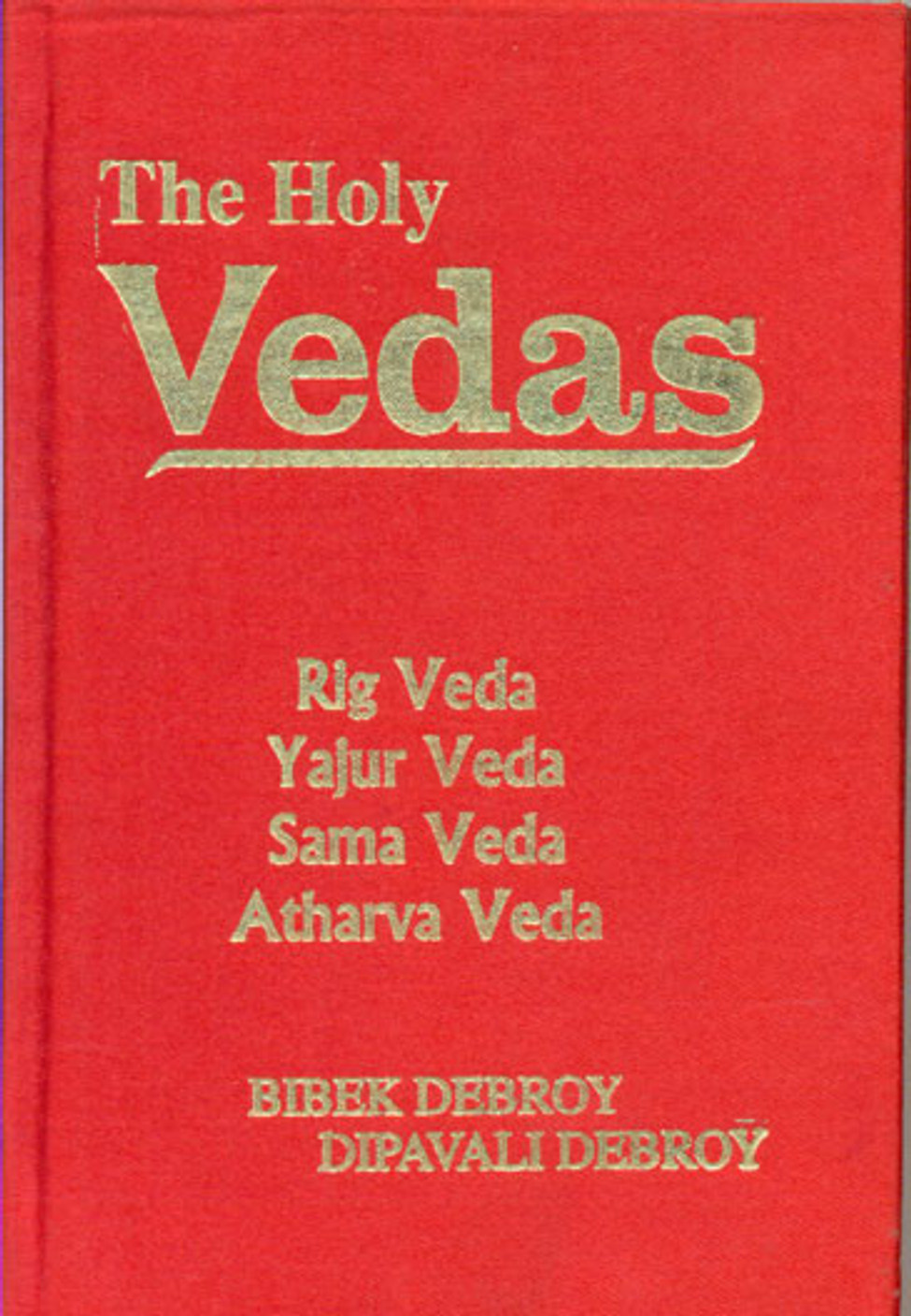4 Vedas In English
The Vedas are the four holiest books of the Hindu religion. They are believed to be one of the oldest books ever made by mankind. They are written in an old Indian language called Sanskrit. They have words (called mantras) which are chanted at the religious ceremonies.
Although they were finally written down sometime between 1,500 and 500 BC they are actually much much older and were passed down orally from one generation to the next possibly over thousands of years. The Vedas have stories about the Hindu gods, instructions for rituals, hymns, poetry, and prayers. The word 'Vedic' means something about the Vedas. The language of the Vedas is called Vedic Sanskrit. Hindus believe the Vedas are the basis of all Hindu religion.
Even later types of Hinduism that are very different from the types of Hinduism that follow the Vedas respect them.The four Vedas are. 1 Rig Veda. 2 Yajur Veda. 3 Sama Veda 4 Atharva veda. The Vedas are considered the earliest literary record of Indo-Aryan civilization, and the most sacred books of India. They are the original scriptures of Hindu teachings, and contain spiritual knowledge encompassing all aspects of our life. Vedic literature with its philosophical maxims has stood th e test of time and is the highest religious authority for all sections of Hindus in particular and for mankind in general.
'Veda' means wisdom, knowledge or vision, and it manifests the language of the gods in human speech. The laws of the Vedas regulate the social, legal, domestic and religious customs of the Hindus to the present day. All the obligatory duties of the Hindus at birth, marriage, death etc.


Vedas English Translation
Owe their allegiance to the Vedic ritual. They draw forth the thought of successive generation of thinkers, and so contain within it the different strata of thought. Origin of the Vedas The Vedas are probably the earliest documents of the human mind and is indeed difficult to say when the earliest portions of the Vedas came into existence. As the ancient Hindus seldom kept any historical record of their religious, literary and political realization, it is difficult to determine the period of the Vedas with precision. Historians provide us many guesses but none of them is free from ambiguity. Who wrote the Vedas?
It is believed that humans did not compose the revered compositions of the Vedas, which were handed down through generations by the word of mouth from time immemorial. The general assumption is that the Vedic hymns were either taught by God to the sages or that they were revealed themselves to the sages who were the seers or 'mantradrasta' of the hymns.
Vedas In English Free Download
The Vedas were mainly compiled by Vyasa Krishna Dwaipayana around the time of Lord Krishna (c. 1500 BC) Classification of the Vedas The Vedas are four: The Rig-Veda, the Sama Veda, the Yajur Veda and the Atharva Veda, the Rig Veda being the main. The four Vedas are collectively known as 'Chathurveda, ' of which the first three Vedas viz., Rig Veda, Sama Veda and Yajur Veda agree in form, language and content.
Vedas In Hindi Pdf
Read about each one of them in detail. Structure of the Vedas Each Veda consists of four parts - the Samhitas (hymns), the Brahmanas (rituals), the Aranyakas (theologies) and the Upanishads (philosophies). The collection of mantras or hymns is called the Samhita. The Brahmanas are ritualistic texts and include precepts and religious duties. Each Veda has several Brahmanas attached to it. The Upanishads form the concluding portions of the Veda and therefore called the 'Vedanta' or the end of the Veda and contains the essence of Vedic teachings.
The Upanishads and the Aranyakas are the concluding portions of the Brahmanas, which discuss philosophical problems. The Aryanyakas (forest texts) intend to serve as objects of meditation for ascetics who live in forests and deal with mysticism and symbolism.
The Mother of All Scriptures Although the Vedas are seldom read or understood today, even by the devout, they no doubt form the bedrock of the universal religion or 'Sanatana Dharma' that all Hindus follow. The Vedas have guided our religious direction for ages and will continue to do so for generations to come. And they will forever remain the most comprehensive and universal of all ancient scriptures.Other scriptures like Quran and Bible are just a 30% of vedas.
I tried manual process but doesn't open my OST file into Outlook. Open MS Outlook. Click the File menu. Select the “Import and Export” wizard or press 't'. From the list, click the “Export to a file” option and then click Next button. Select Personal File Folder (.pst) and then click Next button.  Note: By default, when you add an account that uses an offline Outlook Data File (.ost), the file is automatically created and data from the server is downloaded.
Note: By default, when you add an account that uses an offline Outlook Data File (.ost), the file is automatically created and data from the server is downloaded.
VEDAS ARE THE ULTIMATE SOURCE OF KNOWLEDGE!!! YEAH VEDAS ROCK! WORD TO THE VEDAS!!!